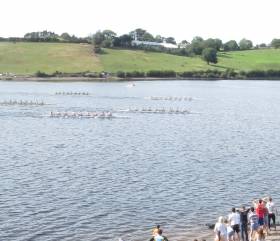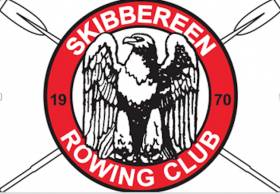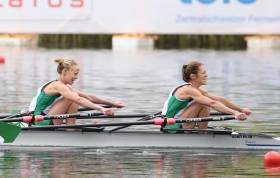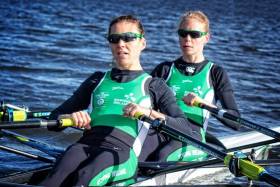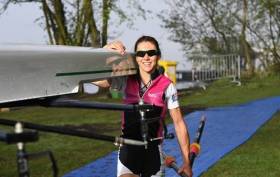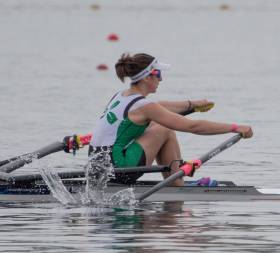Displaying items by tag: Lambe
#Rowing: The big crowds saw a close and exciting senior men’s eight final at the Irish Rowing Championships. Commercial carved out a small lead early on, and despite pressure from NUIG and Skibbereen, they held on to win.
In the women’s senior eights final, UCD/Old Collegians had to wait until the middle stages to take over in the lead, but once they did they built and built on it. They had over three seconds at the finish over Skibbereen/UCC.
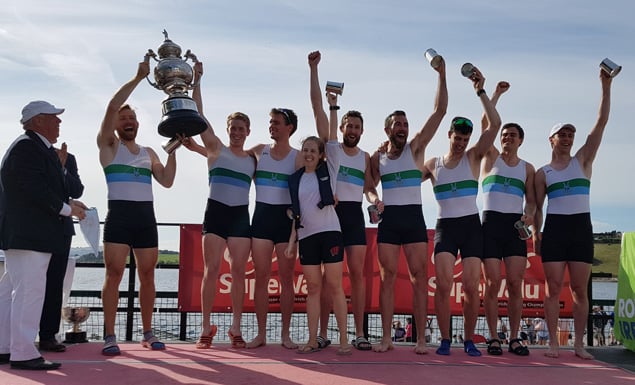 Winners of senior men’s eights (Commercial)
Winners of senior men’s eights (Commercial)
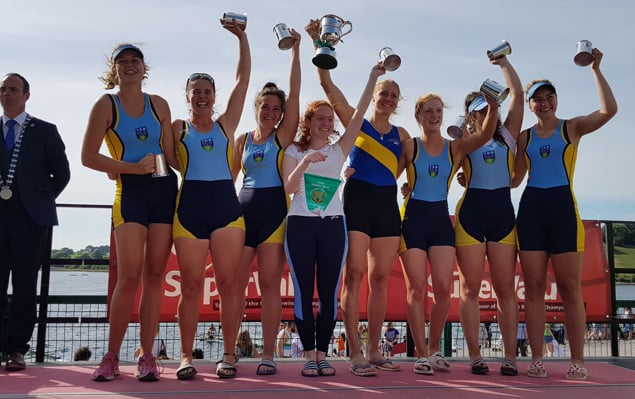 Winners of senior women’s eights (UCD/Old Collegians – Claire Lambe not included)
Winners of senior women’s eights (UCD/Old Collegians – Claire Lambe not included)
NUIG took their ninth title as they lifted the women’s club eight, while Enniskillen brought a very successful end to a good regatta for them by taking the men’s junior pair through Aaron Johnston and Nathan Timoney.
Three Castles also had a fruitful Championships and their junior quadruple won.
Lee and Clonmel won the women’s junior quad and the men’s intermediate double respectively and Bann’s Hannah Scott took the women’s intermediate single sculls title.
Irish Rowing Championships, National Rowing Centre, Day Three (Selected Results)
Men
Eight – Senior: 1 Commercial 5:46.04, 2 Skibbereen 5:47.95, 3 NUIG 5:48.39. Novice: Queen’s 6:21.56.
Four – Club, coxed: NUIG A 6:43.38.
Pair – Inter: NUIG 6:56.09. Junior: Enniskillen B 6:52.04.
Sculling, Quadruple – Junior: 1 Three Castles 6:21.53, 2 Shandon 6:22.75, 3 Clonmel 6:23.05.
Double – Inter: Clonmel 6:37.17. Junior: Three Castles A 6:50.22.
Single – Lightweight: Skibbereen (G O’Donovan) 7:22.32. Inter: Clonmel (D Lynch) 7:10.25.
Women
Eight – Senior: 1 UCD/Old Collegians 6:24.84, 2 Skibbereen/UCC 6:27.96, 3 NUIG/Cork 6:33.67. Club: NUIG 6:46.97.
Four – Inter, coxed: NUIG 7:23.65.
Pair – Senior: UCD (A Crowley, E Lambe) 7:37.41. Junior: Fermoy 7:53.37.
Sculling, Quadruple – Junior: Lee 6:54.96.
Single – Senior: Old Collegians (S Pupsure) 8:02.64. Lightweight: Skibbereen (D Walsh) 8:09.96. Inter: Bann (H Scott) 7:55.58. Club One: Carlow (C Nolan) 8:15.22.
Big Win for UCD's Crowley and Lambe At Rowing Championships
#Rowing: UCD’s Eimear Lambe and Aileen Crowley had an impressive win in the women’s senior pair in the deferred finals at the start of the third day of the Irish Championships at the National Rowing Centre. Skibbereen and Cork were in the touch with the UCD women until 1500 metres, but Lambe and Crowley left the rest behind from there and won by 10 seconds from Skibbereen.
Queen’s were also impressive in their win in the men’s novice eight, and Sanita Puspure won the senior single sculls with plenty to spare.
The junior 16 men’s eight went to Enniskillen, who thus completed the set of wins: the junior 18 and 16 eights for men and women.
Irish Rowing Championships, National Rowing Centre, Day Three (Selected Results)
Men
Eight – Novice: Queen’s 6:21.56.
Sculling, Quadruple – Junior: 1 Three Castles 6:21.53, 2 Shandon 6:22.75, 3 Clonmel 6:23.05.
Women
Pair – Senior: UCD (A Crowley, E Lambe) 7:37.41.
Sculling, Single – Senior: Old Collegians (S Pupsure) 8:02.64.
Skibbereen Regatta Has Big Numbers and Homegrown Stars
#Rowing: Skibbereen Regatta on Friday and Saturday, April 8th and 9th, at the National Rowing Centre in Cork, is a huge event which gives spectators and athletes a chance to see medal winners from Olympic Games, World Championships – and the women’s Boat Race. Claire Lambe, a Boat Race winner last Sunday with Cambridge, teams up with double Olympian Sanita Puspure in a double scull.
Olympic medallists Paul and Gary O’Donovan will join Mark O’Donovan and Shane O’Driscoll in a four and in a quadruple.
Paul O’Donovan, the world champion in the lightweight single sculls, joins Gary in the draw for the Division One single sculls. The event, with an entry of almost 700, is the first in the three-event Grand League: Dublin Metropolitan (Metro) and Cork will follow on in May and June.
Lynch and Lambe Give Ireland Place in Olympic Rowing Final
#Rowing: Sinead Lynch and Claire Lambe qualified for the Olympic Games A Final in Rio de Janeiro today. The Ireland lightweight double finished third behind the Netherlands and Canada, holding off Denmark in a very controlled and impressive performance.
In the first semi-final South Africa won from New Zealand, with China taking third.
Olympic Games, Rio de Janeiro (Irish interest; selected results)
Women
Lightweight Double Sculls - Semi-Finals (First Three to A Final; rest to B Final)
Semi-Final One: 1 South Africa 7:19.09, 2 New Zealand 7:19.27, 3 China 7:20.94.
Semi-Final Two: 1 Netherlands 7:13.93, 2 Canada 7:16.35, 3 Ireland (C Lambe, S Lynch) 7:18.24; 4 Denmark 7:20.29, 5 United States 7:22.78, 6 Germany 7:33.21.
Ireland Rowers Prepare for New Olympic Schedule
#Rowing: The two Ireland lightweight doubles will compete in their deferred heats tomorrow (Monday) at the Olympic Games in Rio de Janeiro. Under the new schedule put in place by Fisa, the lightweight women's double are set to go into action at 3.30 Irish time and the lightweight men at 3.50. The Sunday programme had to be cancelled because the course was not rowable.
Ireland Crews Wait As Weather Forces Rowing Cancellation
#Rowing: The Olympic rowing programme for today, Sunday, has been postponed. The strong crosswinds disrupted a number of races on Saturday and left the Serbian men's pair in the water after a capsize. Ireland single sculler Sanita Puspure had complained about the conditions, saying the boats would not be put out to train in such difficult waters. Two Ireland boats, the women’s lightweight double of Sinead Lynch and Claire Lambe and the men’s lightweight double of Paul and Gary O’Donovan were due to compete in their first race today, but must now wait.
Lynch and Lambe Edged Out of Medals in Record-Breaking Race
#Rowing: Claire Lambe and Sinead Lynch had to settle for fourth in a terrific lightweight double sculls World Cup Final in Poznan. The Netherlands had an excellent start, but Denmark set the pace through the middle stages, with Ireland and world champions New Zealand well in touch. The Kiwis pushed right up by the final 300 metres, and it became a three-boat race, with Ireland just behind. The Netherlands won in a new world best time, with Denmark and New Zealand taking silver and bronze.
World Cup Regatta, Poznan (Irish interest; selected results)
Men
Lightweight Double Sculls - A Final: 1 France (P Houin, J Azou) 6:11.92, 2 Norway (K Brun, A Strandli) 6:14.01, 3 Italy (A Micheletti, M Miani) 6:14.67; 4 Ireland (G O'Donovan, P O'Donovan) 6:15.46, 5 Britain (W Fletcher, R Chambers) 6:20.71, 6 Austria 6:26.06.
Women
Lightweight Double Sculs - A Final: 1 Netherlands (I Paul, M Head) 6:47.69 (World Best Time), 2 Denmark (AL Thomsen, J Rasmussen) 6:49.10, 3 New Zealand (S MacKenzie, J Edward) 6:50.65; 4 Ireland (C Lambe, S Lynch) 6:55.22, 5 Poland 6:55.85, 6 Italy 6:56.92.
Great Win for Lynch and Lambe Takes Them to A Final
# Rowing: On a day which started with a storm, Ireland's Sinead Lynch and Claire Lambe booked themselves a place in the A Final with a calm finish in the World Cup Regatta in Poznan this morning. New Zealand led at half way, but Sophie McKenzie caught a crab and the boat stopped. Ireland, Poland and the Netherlands Two fought it out to take the one A Final place, with Lambe and Lynch holding off a push by the Poles coming up to the line.
World Cup Regatta, Poznan, Poland (Irish interest; selected results)
Women
Lightweight Double Sculls - Heats (Winner to A Final; rest to Repechages) - Heat One: 1 Netherlands 7:04.01.
Heat Two: 1 Ireland (C Lambe, S Lynch) 7:05.36; 2 Poland 7:06.48, 3 Netherlands Two 7:09.28.
#Rowing: Sinéad Lynch and Claire Lambe qualified for the semi-finals of the World Cup in Lucerne this morning with a fine performance in their heat. Drawn against World Champions Switzerland, Germany and Russia, and with just two places available, the Ireland lightweight double scull kept their heads and moved decisively in the third quarter to take the second spot behind winners New Zealand.
World Cup Regatta, Lucerne, Switzerland (Irish interest, selected results)
Women
Lightweight Double Sculls – Heats (Two to A/B Semi-Finals; rest to Repechage) – Heat One: 1 South Africa 6:57.90, 2 China Two 7:01.11. Heat Two: 1 Canada 6:56.56, 2 China One 6:57.98.
Heat Three: 1 New Zealand 7:00.16, 2 Ireland (C Lambe, S Lynch) 7:01.90; 3 Germany One 7:05.79, 4 Russia One 7:06.01, 5 Chile One.
#Rowing: Ireland had two fourth-place finishes in their first two A Finals of the European Rowing Championships in Brandenburg in Germany. The lightweight men’s pair of Mark O’Donovan and Shane O’Driscoll finished impressively to push Germany into fifth. Britain’s Sam Scrimgeour and Joel Cassells won, with Denmark second and Spain third. Lightweight single sculler Denise Walsh also had a good final quarter. Her race was dominated by Anja Noske of Germany, with Denmark and the Netherlands taking silver and bronze. Sinéad Jennings and Claire Lambe finished third in the B Final of the women’s lightweight double sculls, ninth overall. Sweden beat Britain into second, with Ireland over two seconds further back.
European Rowing Championships, Brandenburg, Germany – Day Three (Irish interest; selected results):
Men
Lightweight Pair – A Final: 1 Britain (S Scrimgeour, J Cassells) 7:00.38, 2 Denmark 7:03.94, 3 Spain 7:05.32; 4 Ireland (M O’Donovan, S O’Driscoll) 7:09.67
Women
Lightweight Double Sculls – B Final (Places 7 to 12): 1 Sweden 7:27.70, 2 Britain 7:27.99, 3 Ireland (C Lambe, S Jennings) 7:30.28.
Lightweight Single Sculls – A Final: 1 Germany (A Noske) 8:26.75, 2 Denmark 8:32.54, 3 Netherlands 8:37.05; 4 Ireland (D Walsh) 8:42.93.


























